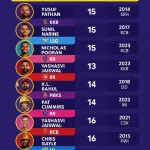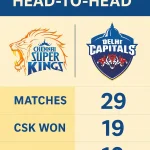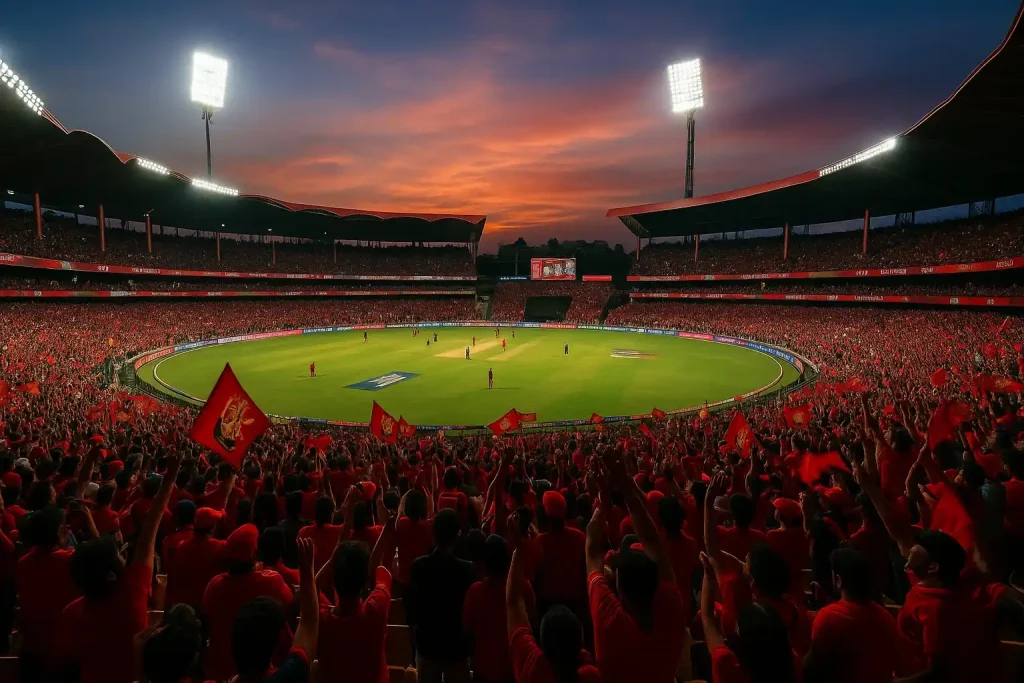
And Why That Matters More Than You Think
There’s a reason RCB feels more like a brand than just a cricket team.
Not every franchise in the IPL gets screamed at, memed, defended, and worshipped in the same breath. Not every squad sells out jerseys months before the season even begins. That cult status? It wasn’t built overnight — and it didn’t come cheap.
Behind the red and gold is a complicated ownership story — one that swings from flamboyance to corporate precision. And in the middle of it all: ambition, money, and a fan base that refuses to let go, even without a single IPL trophy to show for it.
But before we get into why Royal Challengers Bangalore has become one of the most polarizing and beloved franchises in the league…
Let’s rewind the clock.
The Beginning: Vijay Mallya’s Dream in Red
- The first IPL auction. Chaos in suits.
While some owners hedged their bets, Vijay Mallya went big. Nearly ₹111 crore for his franchise — second only to Mumbai Indians at the time. He didn’t just want a team. He wanted a spectacle.
And that’s what he built.
RCB under Mallya wasn’t subtle. From glossy marketing to celebrity-studded campaigns, the team had flash. And it matched Mallya’s own image — part tycoon, part showman, always one glass of champagne away from a controversy.
But RCB’s performance was erratic. Big names like Rahul Dravid, Kevin Pietersen, and Jacques Kallis were drafted, but the chemistry was off. Fans stayed loyal, mostly because they wanted to believe. And also, because Bangalore needed its own rebel story.
But by 2015, the shine was fading. Mallya’s empire — including Kingfisher Airlines — was collapsing. Debts mounted. Headlines changed tone. And slowly, the BCCI and regulators began to tighten their grip.
RCB, once his prized asset, would slip away too.
From Glamour to Governance: Enter United Spirits and Diageo
By 2016, RCB’s ownership had shifted. Quietly, strategically.
United Spirits — already a stakeholder — took formal control. The flamboyance was replaced by boardroom strategy. And behind them? A global giant: Diageo, the British alcohol conglomerate that owns brands like Johnnie Walker and Guinness.
This transition wasn’t loud. There were no champagne parties. No dramatic unveilings.
But the shift changed everything.
RCB, once run on instinct and headlines, became part of a larger corporate puzzle. Budgets got tighter. Decisions grew calculated. The brand matured — and so did the way it was managed.
Yet the heart of the fan base stayed wild.
The irony? The team that once stood for chaos was now being run by one of the most orderly beverage companies in the world.
RCB’s Financial Muscle: It’s Not Just About Virat
People love talking about RCB’s brand value.
But few know what’s behind the curtain.
RCB isn’t just a cricket team. It’s a revenue engine, sitting in the sweet spot between fan worship and commercial brilliance. Even without a title, the franchise has consistently ranked among the most valuable in the league.
It’s partly location — Bengaluru brings together tech billionaires, beer-fueled college crowds, and cricketing nostalgia. But more than that, it’s the way RCB’s ownership has marketed aspiration. Virat. ABD. Gayle. Red jerseys under floodlights. You may laugh at the memes, but the sales keep coming.
Here’s a breakdown of the financial backdrop as it stands today:
RCB Ownership & Financial Overview
| Category | Details |
| Franchise Name | Royal Challengers Bangalore |
| Initial Owner (2008) | Vijay Mallya (UB Group / Kingfisher) |
| Current Owner (Post-2016) | United Spirits Ltd. (subsidiary of Diageo plc) |
| Estimated Team Value | $112–130 million (as of 2024 estimates) |
| Annual Revenue (approx.) | ₹350–400 crore (IPL + sponsorships) |
| Main Sponsors | Qatar Airways, Puma, Muthoot FinCorp |
| Ownership Entity | Royal Challengers Sports Pvt. Ltd. |
| Stadium | M. Chinnaswamy Stadium, Bengaluru |
| Market Focus | Urban youth, high-income cricket enthusiasts |
None of this guarantee wins on the pitch. But it shows something else: RCB can lose matches and still win in business. Not many teams in the IPL can say that with a straight face.
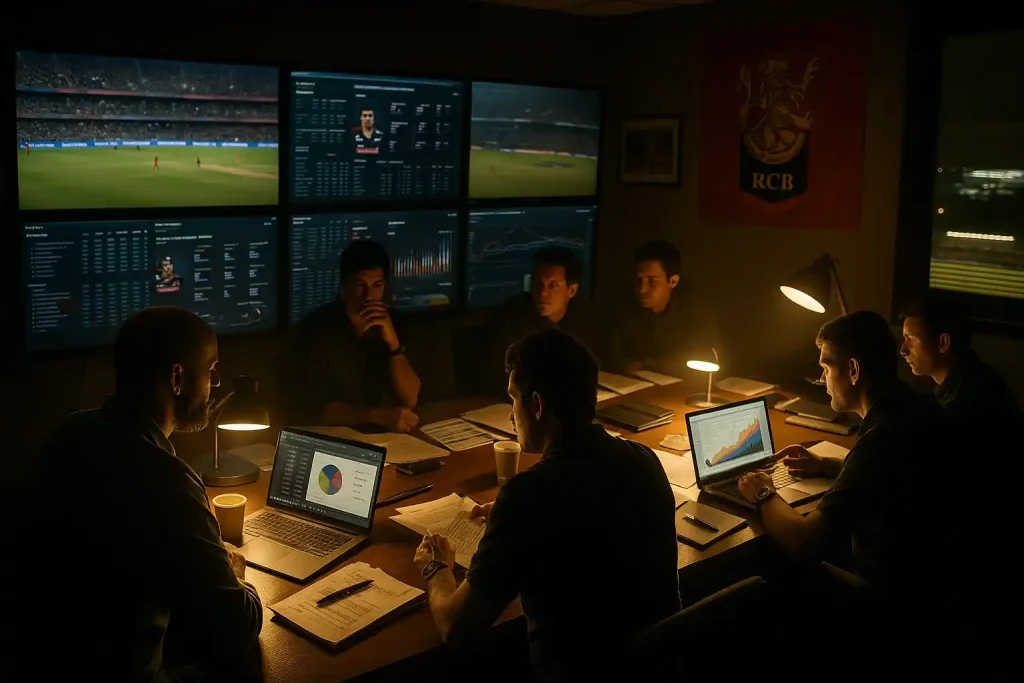
What Hasn’t Changed: The Heartbeat of the Brand
Say what you want about results, RCB still sells hope better than most.
Year after year, fans paint their faces. Pack the Chinnaswamy. Light up Twitter. They don’t just support — they suffer.
And that, ironically, has become part of the brand.
The ownership — now corporate, precise, and deeply brand-conscious — understands this. They play into it. From behind-the-scenes content to merchandise drops to Bangalore-based meetups, RCB keeps the pulse alive even in off-seasons.
Is it all part of a master plan? Or just good timing and better marketing?
Maybe both.
Final Word: Who Really Owns RCB?
Legally? Diageo and United Spirits.
But in spirit?
The guy in Koramangala who’s been buying the new jersey every year since 2008.
The woman in Delhi who cried when ABD retired.
The college kid who went hoarse yelling “Ee Sala Cup Namde!” for the fifth straight season.
RCB’s real owners aren’t just on paper. They’re in the stands. In the bars. Online at 2 a.m. tweeting “Next year’s our year.”
And if you’re one of them?
You already know — trophy or not, this team isn’t just a franchise.
It’s a feeling that refuses to die.
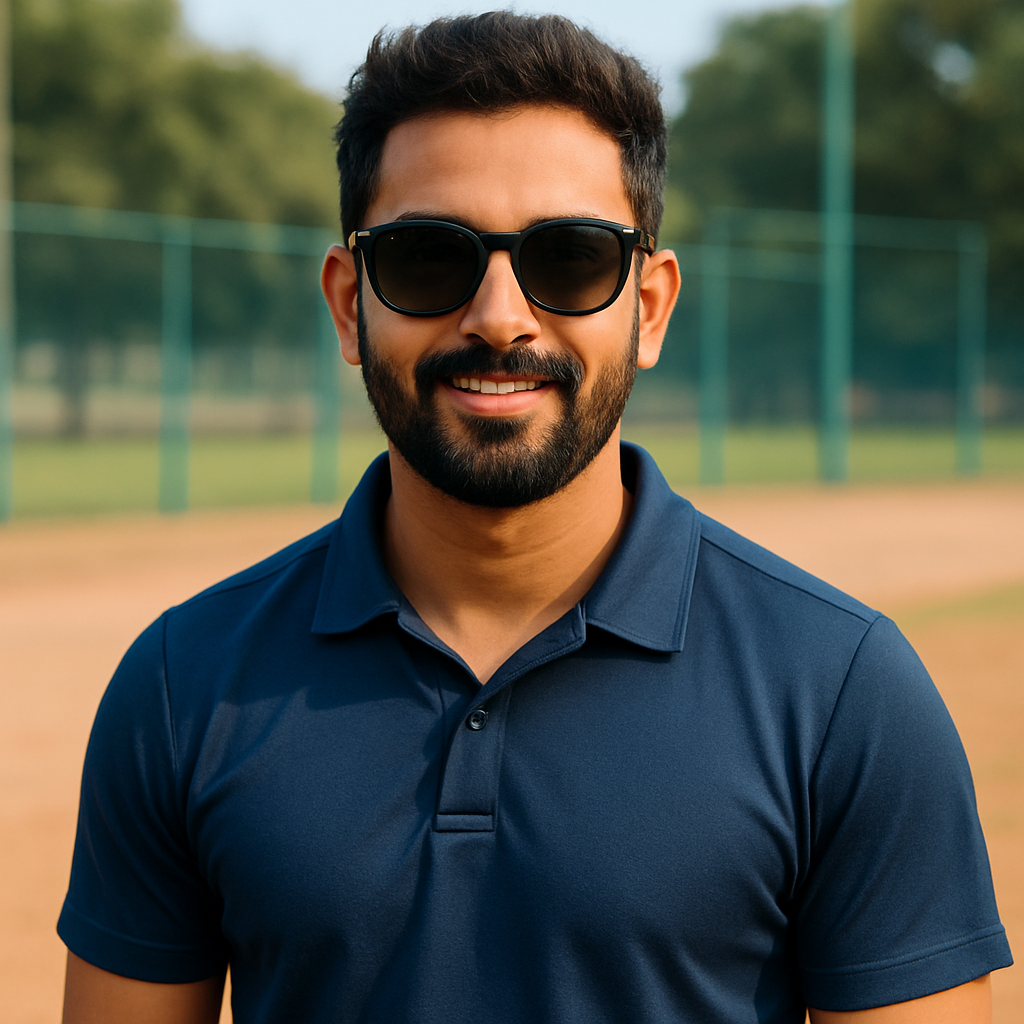
Meet Arjun Kushaan, a passionate cricket analyst at The Cricket24x7. From street matches in his childhood to competitive college tournaments, cricket has always been a central part of Arjun’s life. With a strong background in data analysis and a natural affinity for numbers, he brings a fresh, analytical lens to the game. At The Cricket24x7, Arjun blends his deep love for cricket with his data-driven approach to deliver detailed insights and well-rounded coverage for fans of the sport.


